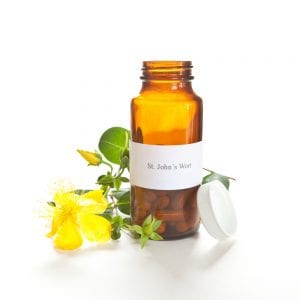Written by Gennea Williams DC, ND. Treatment with Hypericum perforatum (St. John’s Wort) may be an effective therapy for reducing hot flashes, menopausal symptoms, and depression in postmenopausal women.
 Although there are studies that have assessed the effect of H. perforatum on either postmenopausal hot flashes or depression alone, there is a paucity of studies to consider these menopausal complications in combination 1. One of the most significant periods in a woman’s life is menopause which is characterized by the end of the reproductive period 1. Because of a decline in estradiol levels, premenopausal, perimenopausal, and postmenopausal women experience symptoms related to vasomotor instability 2. Although menopause is a physiological and common event, complications like physical and psychological conditions, as well as emotional and social health experience of postmenopausal women may affect their quality of life 1,3.
Although there are studies that have assessed the effect of H. perforatum on either postmenopausal hot flashes or depression alone, there is a paucity of studies to consider these menopausal complications in combination 1. One of the most significant periods in a woman’s life is menopause which is characterized by the end of the reproductive period 1. Because of a decline in estradiol levels, premenopausal, perimenopausal, and postmenopausal women experience symptoms related to vasomotor instability 2. Although menopause is a physiological and common event, complications like physical and psychological conditions, as well as emotional and social health experience of postmenopausal women may affect their quality of life 1,3.
H. perforatum is an herbal plant that has antidepressant activity and contains ingredients such as flavonols derivatives, bioflavonoids, proanthocyanidins, xanthones, phloroglucinol, and naphthodianthrones 1. The antidepressant mechanism of this herbaceous plant is due to the suppression of the consumption of serotonin (5-HT), dopamine (DA) and norepinephrine (NE) from the synaptic cleft of interconnecting neurons 1. The structures of β-diketones A and B were corroborated by syntheses (4 steps starting from methyl acetoacetate, overall yields 30% and 23%, respectively 1. In solution, these β-diketones predominantly exist as two rapidly interconverting β-keto-enol tautomers.
In a recent medical study, a double blind randomized controlled trial was conducted on 80 postmenopausal women, ages 45–60, with at least 12 months of amenorrhea, and having at least two menopause symptoms according to the modified Kupperman index 1. The Hamilton scale was applied for assessing depression 1. The two groups received 270-330 μg of H. perforatum (n = 40) or placebo (n = 40) tablets three times a day for two months 1. The placebo was similar to H. perforatum in terms of shape and color 1.
Seventy women completed the study and five women from each group withdrew from the study. The frequency and intensity of hot flashes and the score of Kupperman scale significantly decreased in the H. perforatum group compared to the control group (p < 0.001). In addition, the intensity of depression significantly decreased in the H. perforatum group compared to the control group. At the end of the study, 80% of women in the intervention group had a reduction of depressive symptoms compared to only 5.7% in the control group (p < 0.001) 1. The results indicated that H. perforatum could significantly reduce the severity of depression of postmenopausal women after 8 weeks. H. perforatum has been proposed to act as an inhibitor of MAO-A and NAOB, inhibit the synaptosomal uptake of serotonin, dopamine and norepinephrine, and down regulate the beta-receptors and up-regulate 5HT2 receptors in the frontal cortex 1.
In this study, extracts of Hypericum perforatum L. proved to be more effective than placebo in the treatment of menopause 5. The herb decreased menopausal symptoms as well as depression after 12 weeks of treatment. The women taking the H. perforatum extract showed significant improvement in psychological and psychosomatic symptoms. Treatment with H. perforatum is an efficient way for reducing the frequency and severity of hot flashes, menopausal symptoms, as well as depression in postmenopausal women 1.
Source: Eatemadnia A1, Ansari S2, Abedi P3, Najar S1. The effect of Hypericum perforatum on postmenopausal symptoms and depression: A randomized controlled trial. Complement Ther Med. 2019 Aug;45:109-113. doi: 10.1016/j.ctim.2019.05.028. Epub 2019 May 31.
© 2019 Elsevier Ltd. All rights reserved.
Posted March 12, 2020.
References:
- Eatemadnia A, Ansari S, Abedi P, Najar S. The effect of Hypericum perforatum on postmenopausal symptoms and depression: A randomized controlled trial. Complementary therapies in medicine. 2019;45:109-113.
- Al-Akoum M, Maunsell E, Verreault R, Provencher L, Otis H, Dodin S. Effects of Hypericum perforatum (St. John’s wort) on hot flashes and quality of life in perimenopausal women: a randomized pilot trial. Menopause. 2009;16(2):307-314.
- Abdali K, Khajehei M, Tabatabaee HR. Effect of St John’s wort on severity, frequency, and duration of hot flashes in premenopausal, perimenopausal and postmenopausal women: a randomized, double-blind, placebo-controlled study. Menopause. 2010;17(2):326-331.
- Radulovic NS, Gencic MS, Stojanovic NM, Randjelovic PJ, Baldovini N, Kurteva V. Prenylated beta-diketones, two new additions to the family of biologically active Hypericum perforatum L. (Hypericaceae) secondary metabolites. Food and chemical toxicology : an international journal published for the British Industrial Biological Research Association. 2018;118:505-513.
- Liu YR, Jiang YL, Huang RQ, Yang JY, Xiao BK, Dong JX. Hypericum perforatum L. preparations for menopause: a meta-analysis of efficacy and safety. Climacteric. 2014;17(4):325-335.
